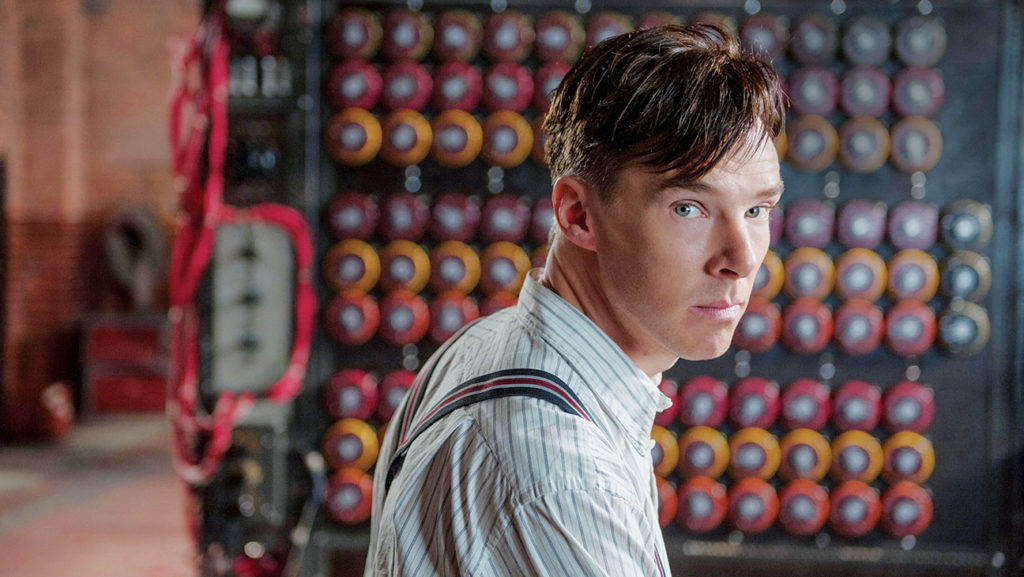LFF: The Imitation Game review
 For their biopic of Alan Turning, the mathematician, code-breaker and all-round unsung hero of World War II, screenwriter Graham Moore and director Morten Tyldum have chosen to focus on three discreet periods.
For their biopic of Alan Turning, the mathematician, code-breaker and all-round unsung hero of World War II, screenwriter Graham Moore and director Morten Tyldum have chosen to focus on three discreet periods.
We first have his school years, for which Turing is played by Alex Lawther; then comes period from when he was first hired to work at Bletchley Park to when he broke Enigma; and finally, his life from 1951 onwards, during which his homosexuality was discovered by the police investigating a break in of his house. In both of these sections, he is played by Benedict Cumberbatch.
The first section is often rather too on-the-nose with its foreshadowing; conversely, the final section tends to be unnecessarily vague at times. The middle chapter, however – which thankfully accounts for the bulk of the running time – features a very effectively drawn dramatic arc that pulls the audience right into both Turing’s obsession and the importance of his work.
This episode begins with Turning being interviewed for the position of Enigma code-breaker at Bletchley Park, though he isn’t, of course, being told this. The interview is conducted by the combative and very proper Commander Denniston (Charles Dance), who ultimately becomes something of a thorn in Turing’s side.
Tyldum has managed to render Turing’s attempts to build a machine that will break the code and help win the war in dramatic, compellingly cinematic terms. The filmmakers also understand the importance of reminding the audience that the code breakers’ work is significant, intercutting the bigger picture with the small-scale, hermetic life in Bletchley Park. The Imitation Game, of course, does dramatically benefit from having the most reliably villainous of adversaries in the shape of Hitler and the Nazis. And Charles Dance..
Despite Cumberbatch’s excellent central performance as Turing, for which he has marshalled telling micro-expressions and an arsenal of unique mannerisms to build a very complex character, the film is not just about Turing’s struggle. Moore and Tyldum have done an an excellent job of also giving Keira Knightley a great deal to do.
Knightley plays Joan Clarke, the only woman who worked on breaking the Enigma code in Bletchley, and somebody who developed a very close relationship to Turing. She provides a great deal of warmth to offset Turing’s occasional coldness, and her position as a woman struggling for a seat at the table is an important reminder that there’s still a long way to go with equal rights, even today, seventy years later. Clarke’s own struggle is dealt with in a sensitive and considered manner and while she is a character that orbits Turing, we are never left thinking that she is in anyway defined by him.
In an unusual move, Moore and Tyldum have shied away from showing us Turing engaging in romantic or sexual relations with other men, with only a little time given over to his schoolboy crush on a fellow classmate. This coyness seems almost at odds with the film’s clear message that the persecution of Turing for his sexuality was wrong. In focusing so heavily on his relationship with Clarke The Imitation Game does get close to an ironically dangerous ‘playing it safe’ territory. Perhaps this will make the story a little bit more palatable for those who still hold prejudices; it would seem to be the intention.
The ultimate fate of Turing, following his arrest for being a homosexual, is probably already known to much of the film’s potential audience. At risk of spoiling those that do not, I will say that it was shameful and a horrible end for the life of a man who had helped save millions of lives.
The Imitation Game is perhaps not particularly remarkable in its technical construction but Tyldum was a safe pair of hands for Moore’s script and has delivered a well built feature for the most part. The screenplay itself is largely effective, if occasionally somewhat corny script: there’s a line that describes the film’s main theme directly, and it even gets repeated. In all, though, this is both an interesting drama and a reasonably intriguing character piece.
There is, however, some question about how the film marks out Turing as the hero who cannot be doubted. While he struggles to build his machine, apparently unwilling to explain why he is so sure of it, he takes on shades of The Fountainhead‘s Howard Roark. The film is rescued here by history; the audience already know that Turing is right, and so this never becomes an obstacle in engaging with Turing as a character.
And how wonderful it was to see the celebration of a character like Turing, a great figure from history who achieved so much and left such a rich legacy. As we’re well reminded by the line “God didn’t win the war, we did,” we have so much for which we should thank Turing, his intelligence, and his devotion to science.
The Imitation Game will be released in the UK on the 14th of November and in America one week later.